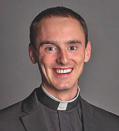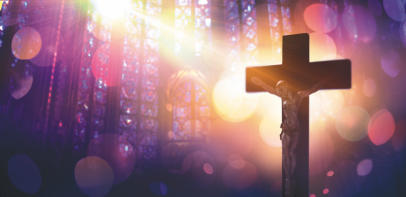 I distinctly remember the first time I went on a retreat. It was my first year of seminary and during Christmas break all of us seminarians at Bishop Bruté (the college seminary our diocese uses in Indianapolis) spent a few days before returning to “the Castle” in prayer and recollection at St. Meinrad Seminary (actually, one of the theology seminaries our diocese also uses). It is a picturesque place – looking out over the rolling, tree-covered, hills of rural Indiana; a peaceful one – away from the busy-ness of the world, the excitements of Christmas back with family, and the efforts and fraternity of seminary life; and one permeated with the prayers of the monks who live there – marked by the hourly chiming of their bell tower prominently standing over the town. But it is not so much those delights that I recall here, but the power of that place to draw me into prayer.
I distinctly remember the first time I went on a retreat. It was my first year of seminary and during Christmas break all of us seminarians at Bishop Bruté (the college seminary our diocese uses in Indianapolis) spent a few days before returning to “the Castle” in prayer and recollection at St. Meinrad Seminary (actually, one of the theology seminaries our diocese also uses). It is a picturesque place – looking out over the rolling, tree-covered, hills of rural Indiana; a peaceful one – away from the busy-ness of the world, the excitements of Christmas back with family, and the efforts and fraternity of seminary life; and one permeated with the prayers of the monks who live there – marked by the hourly chiming of their bell tower prominently standing over the town. But it is not so much those delights that I recall here, but the power of that place to draw me into prayer.
There is something about changing one’s location – physically and spiritually – that invites you into a deeper, more trusting, more profound, more total kind of prayer. With different stone walls to contain my adoration and different colors streaming through the windows to illuminate my meditation, I saw the scriptures and encountered the Eucharist in a renewed way. Drawn out of my “usual” prayer, as I rested with God in the various chapels there, all those graces and gifts of those first months in seminary, and those past weeks around Christmas, flowed through my mind and heart, newly opened to remember them again.
In today’s Gospel, Jesus quotes from the Prophet Isaiah as he responds to the disciples of John the Baptist: “Go and tell John what you hear and see: the blind receive their sight and the lame walk, lepers are cleansed and the deaf hear, and the dead are raised up, and the poor have good news preached to them. And blessed is he who takes no offense at me.” This is a radical new moment in God’s offer of salvation; it’s meant to catch their attention and open their hearts. Advent is the season that takes us back through the utterly worldchanging coming of Jesus Christ. It tugs our hearts and mind into a different place, a different location. If we had gotten accustomed to the readings and prayers of ordinary time, now we have been thrown abruptly back to the tremendous truths of creation, through the saga of salvation history, towards the breathtaking birth of the Savior, and also forward to His resplendent return at the end of everything. The lights, wreaths, smells, and even the change in weather and light outside all similarly draw us into this renewal of our relationship with Christ. They are all meant to dispose us for that meeting, approaching, and kneeling before our baby Lord.
 Here at Cathedral, among plenty of other things certainly, we also have begun again for the season to use the Latin responses at the Sanctus, Mysterium Fidei, and Agnus Dei. It is one simple way to re-open our hearts to the Lord. How deeply language touches us. That’s the power that we’re trying to capture with this change. These are parts of the Mass that the Church, as she has for centuries, encourages us to know in Latin. Why? Because the world does know them! I mean that! I’ve seen it! It is the most incredible, universal, catholic, thing ever to be able to go to Mass anywhere on the planet, and at those points of the Mass realize we can sing together those very same prayers. The Sanctus, the great song of the angels sung above Bethlehem at Christ’s birth, and the Agnus Dei, that central prayer of every Christian begging the Lamb of God, Who takes away the sins of the world, to have mercy on us, now and at our deaths, are probably familiar.
Here at Cathedral, among plenty of other things certainly, we also have begun again for the season to use the Latin responses at the Sanctus, Mysterium Fidei, and Agnus Dei. It is one simple way to re-open our hearts to the Lord. How deeply language touches us. That’s the power that we’re trying to capture with this change. These are parts of the Mass that the Church, as she has for centuries, encourages us to know in Latin. Why? Because the world does know them! I mean that! I’ve seen it! It is the most incredible, universal, catholic, thing ever to be able to go to Mass anywhere on the planet, and at those points of the Mass realize we can sing together those very same prayers. The Sanctus, the great song of the angels sung above Bethlehem at Christ’s birth, and the Agnus Dei, that central prayer of every Christian begging the Lamb of God, Who takes away the sins of the world, to have mercy on us, now and at our deaths, are probably familiar.
But that central one, the Mysterium Fidei, though it is a bit more of a mouthful, is just as central to our faith! The words are as follows: Mortem tuam annuntiamus, Domine, et tuam resurrectionem confitemur, donec venias. This is the same phrase we know well in English: “We proclaim your Death, O Lord and profess your Resurrection until you come again,” but in Latin, these exact words have been said directly following the consecration for 1500 years! When we sing them, at that most central moment of the Mass, we sing with all those centuries of worshipping Christians! I’d like to invite us all to meditate on these words anew and sing them with heart! They truly capture the essence what we believe: that Christ died for us, rose from the dead, and will return in glory. Furthermore, they are our first prayer to Christ newly present in the Eucharist on the altar. He gives us His Body and Blood, participation in His death and resurrection and prepares us for His coming. Let us allow this prayer to fill our hearts as we continue to pray this Advent: “come, Lord Jesus”.
Fr. Dominic Rankin is a Parochial Vicar at the Cathedral of the Immaculate Conception.